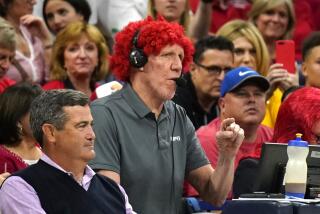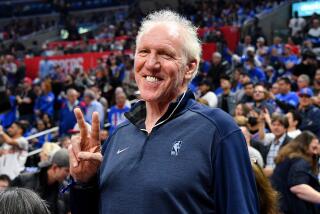It’s no surprise where the legendary UCLA coach picked up his wholesome values
No indoor plumbing. No electricity. No money to speak of.
No complaints.
That was a way of life for the late Joshua Wooden, a soft-spoken Indiana farmer who passed along his wholesome values to each of his four sons. The second-oldest Wooden boy became the greatest coach in the history of college basketball.
“My dad was a gentle man,” said John Wooden, 95. “I never heard him use a word of profanity. I never heard him say an ill word about anybody else. He tried to teach us the farm, and he read Scriptures and poetry to us every night by coal lamp.”
Decades after their deaths, Joshua and Roxie Wooden watch over their lone surviving son. Their yellowed photos, in a small silver frame, rest over the desk in the office of his Encino condominium. The simple shots have an “American Gothic” feel.
In 1924, when John Wooden finished eighth grade, his father gave him a card. On one side was an inspirational verse by Rev. Henry van Dyke. On the other was a seven-point creed that included “Make each day your masterpiece,” which Wooden later used in coaching. To this day, he keeps a copy of that card in his pocket.
“While Dad only finished high school, his reading later gave the initiative to all four of his sons to get through college when there were no athletic scholarships and they had no financial help,” Wooden said. “We all became teachers.”
Maurice, the oldest, went to college in New Mexico before moving to Southern California and becoming principal at West Covina High. Daniel, five years younger than John, also went to college in New Mexico and stayed there as a high school teacher. The youngest, Billy, remained in Indiana and attended Purdue -- John’s alma mater -- and raised seven children as a high school teacher.
The Woodens also had two daughters. Cordelia died at 3 of diphtheria. An unnamed daughter died at birth.
Each of the boys played sports in high school, and the two oldest played in college as well. John was an outstanding basketball and baseball player.
“Dad always used to say, ‘There must be time for play,’ ” Wooden said, “but only after the chores and studies were done.”
On the farm, Joshua Wooden, whose friends called him Hugh, raised cows and hogs, and grew corn, alfalfa, tomatoes and watermelons. The farm, which Roxie inherited from her father, was near Centerton, Ind., about 25 miles south of Indianapolis.
John recalls his father as a horse whisperer of some renown, with an uncanny ability to put restless animals at ease.
“With fractious horses, he could just talk to them and pat them and they’d pull together,” Wooden said. “Whereas some younger driver might be whipping them and they’d be stomping and foaming at the mouth, Dad would take over, stand between them, talk to them, and they’d be gentling down and pull right out.
“With dogs that would scare me, he’d just be petting them and they’d wag their tails. [President] Lincoln said there’s nothing stronger than gentleness, and I think that sort of applied to my dad.”
When John was a sophomore in high school, a stock deal gone bad and the death of dozens of hogs led to the family’s losing the farm. His father took a job as an attendant at a hot springs in nearby Martinsville, Ind., where he spent the rest of his career.
Joshua Wooden died of leukemia at 69 in 1950, 14 years before John Wooden’s UCLA basketball team won its first national championship.
“He was a tremendous influence on me, more so than anyone else,” Wooden said of his father. “I didn’t realize so many things at the time, nor did I realize how difficult it was for my mother at the time -- raising four sons without electricity or running water, with the laundry, the cooking, the canning, the sewing. Pretty rough.”
More to Read
Go beyond the scoreboard
Get the latest on L.A.'s teams in the daily Sports Report newsletter.
You may occasionally receive promotional content from the Los Angeles Times.







